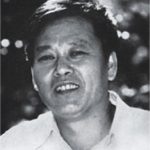 Gu Hua (originally named Luo Hongyu) was born on June 20, 1942 in Jiahe, Hunan Province. After graduation from Zhengzhou Agriculture School in 1961, he worked for a long time on a mountain farm in sounther Huan Province, where he continued to study by himself and where he began to write. His first short story “Sister Apricot” was published in 1962. In the years that followed, Gu hua publishes several short stories dealing with the changes occuring in the countryside after the founding of the People’s Republic in 949. In the autume of 1975, he entered Zhengzhou Song and Dance Troupe, working as a scripwriter. Since 1978, his writings have increasingly shown him to be a writer with a comprehensive understanding of life coupled with consummateartistic technique. The publication of his novel A Small town Called Hibiscus (Furongzhen), which won the first Mao Dun Literary award, elicited an enthusiasitc response among literary circles. The story takes place in a small mountain village of Hunan Province. The author, by describing the misfortues which befall an ordinary wirking woman named Hu Yuyin after she becomes rich through hard work, presents readers with the historical process of rural social reform while exposing the tremendous disaster brought about by the ultra-leftist trend. In addition to this work, Gu Hua has written a number of ostensibly pastoral novels that proffer a systematic historical treatment of rural life and reflect generally on China’s slowly deteriorating social and moral climate since 1949. Recent novels include “Virgin Widows” (1987), and “Rulin Yuan” (The scholar’s garden, 1990).His short story “The Ivied Cabin,” which won him a prize in the National Short Story Competition of 1981, also criticizes the ultra-leftist policies. In 1980, Gu Hua was admitted to the Chinese Writers’ Association and went to Beijing to attend a training course ru by the Cnetral Institute of Literature.
Gu Hua (originally named Luo Hongyu) was born on June 20, 1942 in Jiahe, Hunan Province. After graduation from Zhengzhou Agriculture School in 1961, he worked for a long time on a mountain farm in sounther Huan Province, where he continued to study by himself and where he began to write. His first short story “Sister Apricot” was published in 1962. In the years that followed, Gu hua publishes several short stories dealing with the changes occuring in the countryside after the founding of the People’s Republic in 949. In the autume of 1975, he entered Zhengzhou Song and Dance Troupe, working as a scripwriter. Since 1978, his writings have increasingly shown him to be a writer with a comprehensive understanding of life coupled with consummateartistic technique. The publication of his novel A Small town Called Hibiscus (Furongzhen), which won the first Mao Dun Literary award, elicited an enthusiasitc response among literary circles. The story takes place in a small mountain village of Hunan Province. The author, by describing the misfortues which befall an ordinary wirking woman named Hu Yuyin after she becomes rich through hard work, presents readers with the historical process of rural social reform while exposing the tremendous disaster brought about by the ultra-leftist trend. In addition to this work, Gu Hua has written a number of ostensibly pastoral novels that proffer a systematic historical treatment of rural life and reflect generally on China’s slowly deteriorating social and moral climate since 1949. Recent novels include “Virgin Widows” (1987), and “Rulin Yuan” (The scholar’s garden, 1990).His short story “The Ivied Cabin,” which won him a prize in the National Short Story Competition of 1981, also criticizes the ultra-leftist policies. In 1980, Gu Hua was admitted to the Chinese Writers’ Association and went to Beijing to attend a training course ru by the Cnetral Institute of Literature.
His prominent talent is best dispkayed in his descriptions of Hunan folks and customs. He has created a large body of works including two novels, a dozen novelettes, bearly one hundred short stories, and other prose pieces. He has also published thirteen collections of short stories, two travel books, and a volume of essays. Gu Hua has won eleven literary prizes. His major works have been adapted into film scripts and TV plays.
Gu Hua is now vice-chairman of the Hunan branch of Chinese Writers’ Association. The author has resided in Canada since 1988.
